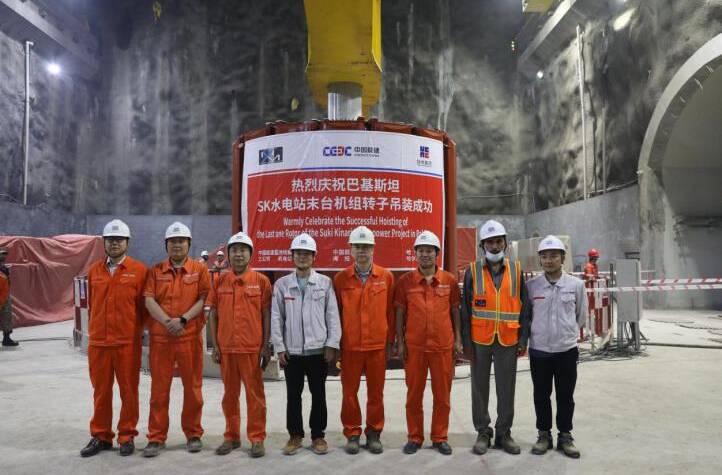The Suki Kinari Hydropower project in northwest Pakistan achieved the hoisting of a core component on Saturday, as a 413-ton rotor, crucial to turning water into electricity, was smoothly installed on the last of four generating units.
The successful hoisting of the last rotor will help advance the construction progress of the power station under the China-Pakistan Economic Corridor (CPEC), located in the Mansehra district of the South Asian country’s Khyber Pakhtunkhwa province. Noting the hoisting of the last rotor as a key milestone of the 884-megawatt hydropower project, Yu Zhiliang, assistant general manager of the Suki Kinari Hydropower project of the Overseas Investment Company of China Gezhouba Group, which invests in and implements the project, said that it marks the installation of the unit body of the hydropower station is coming to an end, China’s state run Xinhua reported.
It is also a solid step for the waterless commissioning of four generating units in the coming six months, said Yu. The hydropower project started construction in January 2017. Once getting functional, the CPEC project will annually generate some 3.21 billion kilowatt-hours of clean electricity, replacing 1.28 million tons of coal and reducing 2.52 million tons of carbon dioxide emissions per year, said Yu. It will significantly optimize Pakistan’s energy structure, boosting the country’s economic and social development, he added. According to details, the rotor of unit four was successfully hoisted which was celebrated by the engineer and workers of the project.
The 884MW SKHPP is developed under the umbrella of China-Pakistan Economic Corridor (CPEC) at River Kunhar (a tributary of River Jhelum) at Mansehra, Khyber Pakhtunkhwa (KP). China Gezhouba Group Company Ltd (CGGCI) is the sponsor of the project which is being executed by Suki Kinari Hydro (Pvt) Ltd. The total investment of the project is $1.96 billion. The project has created more than 4,000 jobs during its construction while more than 70% of the work has been completed which will serve for 30 years. Upon completion, the project will each year produce 3.2 billion kWh for Pakistan. The project is expected to be completed later this year.
















